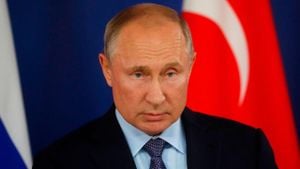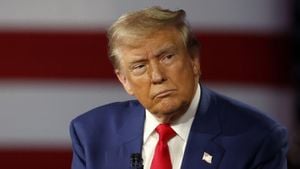The world watches as the Ukraine conflict escalates dramatically, with fresh fears surrounding the potential for nuclear confrontation. Recent developments are shaking up the already precarious situation, urging international leaders to reconsider their strategies. Allegations of military support are intensifying, with long-range missile systems now being deployed on both sides, setting the stage for increased hostilities.
The backdrop to this escalation has been marked by bold moves from both Russia and the West. President Joe Biden's administration made waves by permitting Ukraine to deploy U.S. Army Tactical Missile Systems (ATACMS) against Russian targets. This decision reversed the previous U.S. stance of avoiding such actions for fear of triggering direct confrontation with Russia. The impact of this shift is vivid, as it has opened the floodgates for larger military operations.
Meanwhile, President Vladimir Putin has lowered Russia's threshold for the use of nuclear weapons, indicating his willingness to respond to conventional attacks with nuclear force if they occur on Russian territory and involve U.S. support. The Kremlin's announcement suggests Moscow is serious about its warnings, marking a concerning departure from previous rhetoric about using nuclear options only as absolute last resorts.
The week of November 21 saw unprecedented actions: Ukraine launched ATACMS missiles targeting Russia, and Putin’s military responded with the Oreshnik hypersonic missile aimed at Ukraine, showcasing significant advancements on both sides. This missile, which reportedly travels at speeds ten times greater than sound, raises alarms globally, reminding everyone of the lethal capabilities involved.
What does all this mean for the conflict? While Ukraine is gaining newfound capabilities to strike deep within Russian territory, the Russian military's counteractions signal its readiness to escalate matters. The Oreshnik, for one, was fired at Ukraine amid Putin's warnings to nations supplying Ukraine with weaponry. The message is clear: any country supporting attacks on Russian territory may itself become a target.
The tensions surrounding escalation are palpable, and both nations are bracing themselves for heightened confrontations. Observers noted how Ukraine, now backed with advanced weaponry, is attempting to secure its sovereignty against what it perceives as unprovoked aggression. Yet as Kyiv ramps up its military ambitions, the Kremlin appears equally determined to project strength and resolve.
International experts are increasingly concerned about the ripple effects this situation generates worldwide. Ukrainian President Volodymyr Zelensky highlighted the dangers Russia's actions pose not just to Ukraine but to Europe and beyond, emphasizing the need for coordinated responses from allies to contain the threat of nuclear war. He called for new air-defense systems and countermeasures to neutralize the risk presented by hypersonic missiles.
The stakes have escalated to dramatic dimensions. NATO has reacted by scheduling emergency meetings with Ukraine to assess the rapidly shifting battlefield conditions. The discussion revolves around how to assist Ukraine effectively, without provoking Russia to retaliate aggressively. Reactions from Western officials have underscored the need for careful navigation of the diplomatic waters, as each action carries weighty consequences.
Poland's Prime Minister recently weighed in, warning of the decisive phase the conflict has entered, highlighting the urgency for collaborative strategies. The uncertainty surrounding Putin's next steps adds to the tension; as the Russian leader grapples with both internal and external pressures, the global community remains wary of miscalculations leading to catastrophic outcomes.
Interestingly, amid the chaos, analysts have observed psychological dimensions at play. Putin's actions are partly driven by longstanding resentments toward the West, reflecting personal and national pride. The potential for emotional decision-making introduces another layer of complexity, as assessments of rationality can swiftly be overshadowed by anxious impulses.
Putin's decree, highlighted during his recent speeches, stresses the message of deterrence. His assertion of Russia’s right to retaliate against any country diminishing its sovereignty indicates his intent to signal strength. Still, the prospect of nuclear weapons being deployed—regardless of their tactical nature—requires vigilant attention from global leaders.
The last few days laid bare the fragility of peace and the precarious balance of military engagement. Each strike, whether initiated by Ukraine or Russia, serves to intensify fears of wider conflict. Many analysts urge caution, reevaluated strategies, and calls for dialogue to mitigate the danger of missteps igniting greater violence.
For now, the world holds its breath, with the hopes of averting nuclear disaster resting on strategic minds. The recent events only underline the need for sustained diplomacy and reaffirm the importance of preventing escalation from spiraling out of control. The next moves made by Russia, Ukraine, and their respective allies will be pivotal, as they navigate this complex battlefield.
Would Putin truly entertain nuclear options over strikes on military installations deeply entrenched within the limitations of conventional conflict? Only time will tell, as leaders strive to decode the unpredictability of this new chapter marked by fear, anticipation, and geopolitical maneuvering.
With soaring stakes and pervasive uncertainties, observers are left wondering whether the international community can effectively intervene to stabilize the conflict or if fate has already set the stage for greater calamity.



